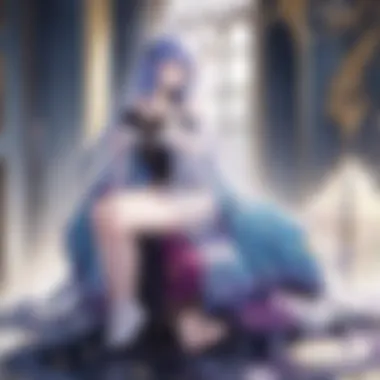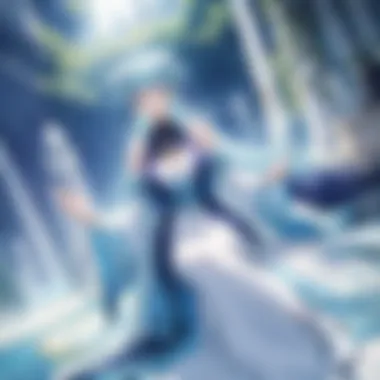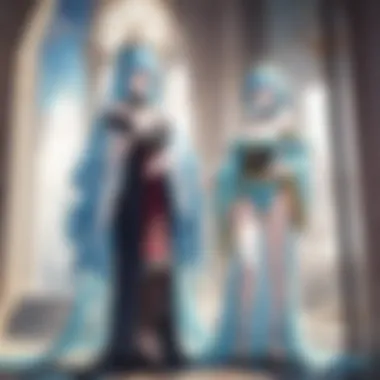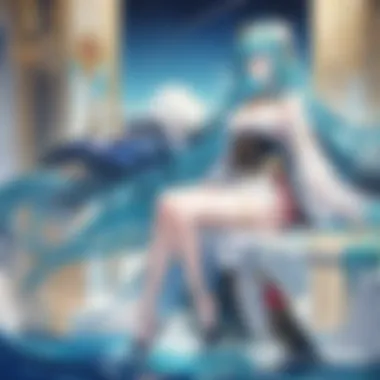Exploring 'Maoujou de Oyasumi': Fantasy Unveiled


Intro
In recent years, Maoujou de Oyasumi has emerged as a significant title within the anime and manga landscape. The series has gained a following for its intricate storytelling and engaging characters. This article aims to dissect the elements that make this series unique, from its characters to the themes that underpin its narrative.
The exploration will delve into the various character profiles, the central themes presented, and assess the cultural references imbued in the narrative. Examining these components ultimately leads to a better understanding of ‘Maoujou de Oyasumi’ and its role in the broader spectrum of modern anime.
By analyzing both reception and influence, this piece serves as a guide for those interested in diving deeper into its enchanted realm.
Character Profiles
Overview of Main Characters
At the heart of Maoujou de Oyasumi are its compelling main characters. The protagonist, Saito, is a unique spin on the typical hero archetype. Unlike many characters in fantasy narratives, he approaches the challenges of his enchanted realm with a distinctive pragmatism and a sense of humor. His interactions with the demon lord, Luna, showcase a blend of comedic elements and genuine camaraderie, highlighting the heart of the story.
Luna, on the other hand, defies expectations of villainous characters, presenting a nuanced personality filled with depth. She occupies a space that allows for both menace and vulnerability, crafting a three-dimensional figure that readers and viewers can empathize with. Her motivations are often questioned, adding layers to her character.
Supporting Characters
The supporting cast in Maoujou de Oyasumi further enriches the narrative landscape. Characters like Elena and Mitsuki provide comic relief and insight into the story's world. Each supporting character contributes to the unfolding drama and comedy, creating a diverse and well-rounded cast. These figures often serve as mirrors, reflecting the growth and dilemmas faced by the protagonists.
Theme Exploration
Central Themes
Maoujou de Oyasumi tackles several themes that resonate with audiences. The collision of responsibility and desire is prevalent, especially as characters navigate their duties amidst personal ambitions. The transformation of adversarial relationships into friendships illustrates a recurrent theme of forgiveness and understanding.
The show also explores the concept of escape. Many characters find sanctuary in their dreams and aspirations, which further develops the idea of seeking comfort in a chaotic world.
Cultural References
Cultural references embedded within the series provide a seasoned audience with layers of meaning. From subtle nods to Japanese folklore to parodies of popular anime tropes, each reference serves as a reminder of the storytelling skills found in contemporary anime. Such elements also empower the narrative with a sense of relatability, enhancing the viewer's engagement.
The End
In summary, Maoujou de Oyasumi is not merely a whimsical tale of fantasy. It is a story deep with character development and meaningful themes that resonate with a broad audience. The narrative's humor, combined with its nuanced character portrayals, makes it a noteworthy title in modern anime. It extends an invitation for viewers and readers to reflect on their own experiences while immersing into a captivating world.
By examining characters, themes, and cultural impacts, this article hopes to underscore the importance of 'Maoujou de Oyasumi' in understanding contemporary animated narratives.
Prologue to Maoujou de Oyasumi
The significance of Maoujou de Oyasumi in the contemporary anime landscape cannot be understated. This series embodies a unique blend of humor, fantasy, and social commentary, which resonates with audiences of varying backgrounds. In this section, we lay the groundwork for understanding the series by reflecting on its origins and thematic underpinnings.
Background of the Series
Maoujou de Oyasumi, which translates to "Goodnight at the Demon Castle," is a manga authored by Yumi Nakata. The series began serialization in 2018, quickly gaining recognition for its unconventional premise. It distinguishes itself by depicting the daily life of a demon lord's daughter who prioritizes her sleep over all else. The original manga was later adapted into an anime, which premiered in 2020. This adaptation broadened its audience base and highlighted the whimsical nature of the source material.
The cultural context in which the series operates plays a crucial role. Sleep and rest are often overlooked in modern society, making the subject relevant. The series satirizes the norms surrounding productivity and reinforces the value of taking time to rest. This underlying message is what elevates Maoujou de Oyasumi beyond mere entertainment.
Overview of the Plot
The narrative centers around a young girl named Yawns, who is the daughter of a powerful demon lord. Her primary desire is to enjoy uninterrupted sleep, which creates a stark contrast with the expectations of her surroundings. The plot intricately weaves together elements of fantasy and comedy, showcasing various encounters and conflicts that arise from her sleepy disposition.


In the backdrop of a richly imagined world filled with wacky characters, Yawns navigates her unusual life with a charming and laid-back attitude. As the series progresses, it explores themes of self-acceptance and the importance of personal happiness. The humor often stems from the absurd situations she finds herself in, as well as her interactions with both allies and enemies.
This foundational overview provides insight into the captivating world of Maoujou de Oyasumi, as it invites viewers to reconsider conventional notions of heroism and villainy in an enchanted realm.
Central Themes in Maoujou de Oyasumi
The central themes in Maoujou de Oyasumi play a crucial role in enhancing the narrative. They provide depth to the characters and set the tone for the unique storytelling that defines this series. Each identified theme contributes to an understanding of the character motivations and drives the plot forward, engaging the audience on multiple levels.
The Concept of Rest and Sleep
Rest and sleep are not just background elements but are integral to the very fabric of Maoujou de Oyasumi. This theme is explored primarily through the protagonist, Yawns, who embodies relaxation and the pursuit of sleep in a chaotic world where the concept of sleep is often undermined. The narrative frames sleep as a sanctuary, a place of peace amidst the turmoil created by misunderstandings and conflicts.
The portrayal of sleep reflects a cultural appreciation for rest, inviting viewers to dream and reflect on their own relationship with sleep. The impact of sleep deprivation is emphasized in contrast, serving as a societal mirror. In a world where characters hustle and strive for their motives, the ease with which Yawns seeks tranquility encourages viewers to question the value of rest in their own lives.
This theme also resonates with audiences dealing with stress and fatigue, as it highlights the necessity of restoring one’s energy. By prioritizing rest, the series sets a precedent; where many view rest as a luxury, in Maoujou de Oyasumi, it is a vital necessity.
The Dichotomy of Good and Evil
The struggle between good and evil is a classic theme in storytelling, but in Maoujou de Oyasumi, it is presented with nuance. Characters are not strictly defined as heroic or villainous. Instead, the show presents a more complex portrayal of morality. This allows viewers to engage with the idea that intentions often blur the lines between right and wrong.
For example, the antagonistic forces that Yawns faces are not mere embodiments of evil. They are multifaceted characters driven by their motives, fears, and desires. This creates a narrative that is not only engaging but prompts reflection about the nature of evil and the parameters of good. In doing so, the series challenges viewers to consider perspective in moral dilemmas.
The complexity of these characters fosters a more thoughtful discussion on ethical issues. As the audience navigates alongside Yawns, they come to appreciate the shades of gray within character motivations, enhancing the emotional breadth of the series.
Humor and Its Function
Humor serves as an essential vehicle for storytelling in Maoujou de Oyasumi. It operates not only as a source of entertainment but also as a tool for exploring deeper themes. The series employs various comedic elements including situational comedy and character quirks to create levity, even in moments addressing serious themes like conflict and identity.
By interspersing humor throughout the narrative, Maoujou de Oyasumi cultivates a welcoming atmosphere. This makes it easier for viewers to engage with difficult subjects without feeling overwhelmed. Humor helps in breaking tension, allowing for emotional swings that keep audiences invested.
Furthermore, humor highlights the absurdities in life, particularly in the face of overwhelming challenges. It invites reflection on the human condition, making the series resonate with those who appreciate both laughter and introspection. In combining humor with critical themes, Maoujou de Oyasumi effectively broadens its impact and appeal.
Character Analysis
Character analysis is a vital aspect of understanding Maoujou de Oyasumi. This series introduces a rich tapestry of characters that shape its narrative and thematic depth. Each character plays a significant role in conveying the story's messages—be it through their motivations, conflicts, or relationships. Readers and viewers often connect with characters on various levels, making it essential to dissect their traits and roles. Analyzing the characters enables a deeper appreciation of the overall storytelling and how it reflects cultural themes.
Understanding character dynamics can also provide insight into the societal issues prevalent in the world of Maoujou de Oyasumi. It invites the audience to reflect on their complexities and fosters an engagement with the narrative that goes beyond mere entertainment.
The Protagonist: Yawns' Role
Yawns serves as the central figure in Maoujou de Oyasumi, providing a relatable point of view for the audience. Her character represents a harmonious blend of innocence and strength. As a character who values her sleep highly, she embodies the theme of rest, which resonates throughout the series. Yawns' journey captures the audience's attention, as she navigates through the challenges posed by a world that often undervalues the need for rest.
Her interactions with both friends and foes reveal much about her nature. Yawns balances her desire for peaceful sleep with a growing understanding of her surroundings and the conflict within the realm. Through her, the series creatively explores the concept of personal boundaries in a chaotic environment. This position makes her growth compelling for audiences, as they watch her learn the weight of responsibility while still holding on to the simple pleasures of life.
The Antagonistic Forces: A Closer Look
The series presents a cast of antagonists that significantly challenge Yawns. They represent various forms of conflict, which push Yawns to reconsider her passive lifestyle. From malicious demons to rival characters with their own agendas, these forces bring depth to the storyline. They do not simply act as obstacles; they symbolically reflect fears concerning the implications of neglecting rest and self-care.
Each antagonist serves a specific purpose in the plot. For example, the character of the Demon Lord showcases a misinterpretation of power, trying to dominate a realm while missing the essential elements of peace and relaxation. Such contrasts heighten the stakes of the series and create a sense of urgency in Yawns' quest. Therefore, analyzing these antagonistic forces reveals underlying themes about societal pressures and the importance of nurturing one's well-being—as shown through the lens of fantasy and conflict.
Supporting Characters and Their Dynamics


Supporting characters in Maoujou de Oyasumi enrich the narrative by offering diverse expressions of themes found within the story. Each character, from loyal friends to intriguing rivals, contributes unique perspectives that reflect communal views on rest, duty, and personal desires. Their relationships with Yawns enhance her journey and the overall narrative.
For instance, characters like the lovable golem and the quirky witch exemplify camaraderie that depicts the importance of friendship in facing adversities. Through their playful banter and moments of serious alliance, they instill a sense of warmth in the storyline. Furthermore, rival characters often provide philosophical challenges to Yawns, prompting her to confront her values directly.
These dynamics create a well-rounded framework for understanding the plot in its entirety.
"The supporting cast does not merely exist in relation to the protagonist; they enhance fundamental themes that make the narrative rich and multifaceted."
Artistic Elements
The artistic elements of Maoujou de Oyasumi significantly contribute to its narrative depth and emotional resonance. The series stands out not just for its storytelling but also for how these elements shape the viewer's experience. This section will explore the visual aesthetics and animation techniques that enhance the fantasy world and the characters within it.
Visual Style and Aesthetics
The visual style of Maoujou de Oyasumi plays a crucial role in establishing the tone and atmosphere of the series. The design choices are vibrant and engaging, reflecting the whimsical yet serene nature of the narrative. Character designs are distinct, with a noticeable emphasis on exaggerated features that endear them to the audience while fitting perfectly within the fantasy genre.
Color palettes used throughout the series contribute to different moods. Bright colors dominate scenes of levity and joy, while muted tones often accompany darker moments. Such use of color helps viewers connect emotionally with the unfolding events. Not to mention, the backgrounds often provide a rich tapestry that immerses the audience into the enchanted realm, contrasting and complimenting the characters’ actions.
"The fusion of character and background design in Maoujou de Oyasumi creates an atmosphere that feels alive, enhancing the engagement of the audience." - Expert Review
Furthermore, the aesthetics are not just limited to character and background design. Symbolic imagery throughout various scenes subtly reinforces themes of rest and the conflict between good and evil. These aesthetic choices elevate the narrative from mere entertainment to something that evokes contemplation and emotional reflection.
Animation Techniques Utilized
The animation techniques in Maoujou de Oyasumi showcase a blend of traditional and modern practices. The creators utilize digital animation to create smooth transitions and fluid movements that effectively capture the whimsical nature of the story. A careful balance is struck between motion and expressiveness, allowing characters to convey a wide range of emotions through their actions.
The use of frame-by-frame animation in key scenes adds an artistic flair that highlights important plot moments. For instance, pivotal emotional exchanges often feature meticulous attention to detail in character reactions. This technique ensures that the audience fully grasps the emotional stakes of the narrative.
Moreover, certain sequences employ impactful visual effects to underscore the magical elements of the story. These range from sparkling spells to the gentle flow of magical energy that enhances battle scenes, making them striking and memorable.
Cultural Impact and Reception
The cultural impact and reception of 'Maoujou de Oyasumi' are significant facets that contribute to a deeper understanding of its place within the anime and manga landscape. This series does not exist in a vacuum; it interacts with and reflects broader societal trends and values. As viewers engage with the narrative, they also connect with underlying themes that resonate within contemporary culture, particularly regarding the concept of rest and the balance between duty and personal well-being. This series prompts discussions about the importance of sleep, which is often overlooked in fast-paced modern life. By addressing such relevant themes, 'Maoujou de Oyasumi' establishes itself as more than mere entertainment—it becomes a commentary on social norms and expectations.
Audience Reception and Critique
The audience reception of 'Maoujou de Oyasumi' has been predominantly positive, with many viewers praising its light-hearted yet thought-provoking narrative. The unique premise of a demon lord seeking a good night's sleep presents a refreshing twist in the fantasy genre. Fans appreciate the series for its clever humor and relatable themes. For instance, viewers often identify with the protagonist's quest for rest amid chaotic surroundings, making the story resonate on a personal level. Critiques tend to focus on the pacing of the story or character development. However, most fans contend that these aspects do not detract significantly from the overall enjoyment of the show.
Among the analysis on platforms like reddit.com, users frequently share insights and personal experiences that link back to the themes presented in the series. Many viewers cite instances of sleep deprivation in their own lives, resulting in a deeper connection to the series. This organic interaction fosters a sense of community around the shared appreciation for both the humor and the underlying message.
Comparison to Other Similar Series
When comparing 'Maoujou de Oyasumi' to other series within the same genre, certain similarities and differences become apparent. For instance, 'Sleepy Princess in the Demon Castle' parallels works like 'Re:Zero - Starting Life in Another World' and 'KonoSuba: God's Blessing on This Wonderful World!' in its subversion of traditional fantasy tropes.
Unlike 'Re:Zero,' which often delves into darker themes and heavy dramatic arcs, 'Maoujou de Oyasumi' maintains a more whimsical and comedic tone. This allows it to explore serious themes such as the need for rest without burdening the audience with excessive seriousness.
Series like 'KonoSuba' utilize humor to poke fun at fantasy conventions, a strategy also employed by 'Maoujou de Oyasumi.' However, the latter uniquely focuses on the quest for sleep, offering a fresh narrative angle. As the genre evolves, this series stands as a beacon of light-heartedness, pushing boundaries while still addressing topics relevant to viewers today.
The Evolution of 'Maoujou de Oyasumi'
The journey of 'Maoujou de Oyasumi' from manga to anime showcases its adaptability and the growing significance of its narrative in contemporary media. Understanding this evolution is vital for appreciating the series' appeal, as well as its influence on both creators and audience.


From Manga to Anime
'Maoujou de Oyasumi' originated as a manga series written and illustrated by KumaJT. Its initial format provided an intriguing canvas for exploring the whimsical yet profound themes rooted in sleep, dreams, and conflict. The manga encapsulated a unique blend of lightheartedness and thoughtfulness, which was well received among readers. As the narrative unfolded, the careful character development and engaging story arcs drew attention.
The transition to anime was not merely a replication of the manga. Instead, the animated adaptation took the core elements of the manga and amplified them through visuals and sound. The anime allows for a richer expression of emotions, as movements and voice acting breathe life into its characters. Furthermore, animation techniques brought visual spectacle to serene moments of rest and the chaos of battles, enhancing both themes significantly.
Key adaptations from manga to anime include:
- Enhanced visual storytelling, emphasizing facial expressions.
- Sound design that enriches the experience, conveying nuances in tone and atmosphere.
- Pacing adjustments which allow for deeper engagement with meditation on sleep, enhancing the narrative’s core.
By expanding to an animated series, 'Maoujou de Oyasumi' not only reached a broader audience but also invited viewers to engage critically with its themes, delivering a compelling experience that encourages reflection on rest and the human condition.
Influence on Contemporary Works
The influence of 'Maoujou de Oyasumi' extends into various facets of modern anime and manga. Its unique take on fantasy has inspired a slew of works that echo its focus on nuanced character interactions and the significance of seemingly mundane activities.
Notable influences include:
- Character-Driven Stories: Many contemporary anime now prioritize character depth and interpersonal relations, encouraging a narrative style similar to that of 'Maoujou de Oyasumi.'
- Theme of Rest: The exploration of rest and relaxation as core themes has grow in appeals to a market increasingly aware of mental health issues and self-care.
- Mixing Genres: The show's success has allowed new creators the freedom to blend various genres, such as fantasy with slice-of-life, resulting in innovative storytelling techniques.
In summary, 'Maoujou de Oyasumi' not only captivates with its original narrative but also shapes the landscape of anime and manga, demonstrating the far-reaching impact of its evolutionary journey. The balance and interplay between a fantastical narrative and grounded themes resonate strongly in today’s creative environment.
The Role of Sleep in Japanese Culture
Sleep plays a significant role in the cultural fabric of Japan. It reflects societal values, personal well-being, and traditional practices that shape daily life. In the context of 'Maoujou de Oyasumi', the theme of sleep adds depth to the series, illustrating how it intertwines with personal identity and cultural expectations. Therefore, understanding its significance illuminates not only the narrative of the anime but also the broader cultural landscape of Japan.
Cultural Significance of Sleep
Sleep is often seen as a virtue in Japan. It symbolizes a time for restoration and self-care. Traditionally, the concept of taking a nap or resting during the day is culturally accepted and even encouraged. This aligns with the notion of inuin, which refers to the practice of taking short naps, often a welcome break from a fast-paced lifestyle.
Moreover, sleep is valued for its health benefits. In various cultural practices, including certain forms of meditation and relaxation techniques, sleep is essential for maintaining both mental and physical well-being. 'Maoujou de Oyasumi' illustrates this theme effectively by portraying characters who embrace sleep as a form of power, providing them strength in their quests.
Sleep Deprivation in Japanese Society
Despite the cultural appreciation for sleep, Japan grapples with a paradox of sleep deprivation. The demands of modern life often lead to insufficient rest. Long working hours, academic pressures, and social obligations can create a culture where sleep is sacrificed for productivity. This condition has far-reaching implications, such as increased health issues, mental fatigue, and decreased quality of life.
In 'Maoujou de Oyasumi', this societal issue is subtly reflected through characters who crave rest amid chaos. The message is clear: sleep deprivation is not only a personal issue but a collective societal challenge that needs addressing.
Ultimately, the discourse around sleep in Japan is complex. While it emphasizes the need for rest, the realities of modern life bring forth challenges. 'Maoujou de Oyasumi' serves as a lens to explore these conflicting themes, encouraging viewers to contemplate the balance between productivity and rest in their own lives.
Ends and Future Directions
The section on conclusions and future directions plays a crucial role in synthesizing the insights gathered throughout this article. By examining the layers of storytelling present in 'Maoujou de Oyasumi', we can understand how it reflects contemporary society, both in Japan and beyond. This thematic richness offers ample opportunities for further discourse.
Summarizing Key Findings
The core findings from this exploration reveal that 'Maoujou de Oyasumi' is not just a whimsical fantasy tale. It intertwines complex themes of rest, cultural narratives about sleep, and morals surrounding good and evil. The protagonist, Yawns, symbolizes the need for personal rejuvenation amidst external adversities. The unique approach to humor also provides a refreshing contrast to the often serious tones found in similar narratives.
- The unique comedic style enhances character interactions.
- The delicate balance between lighthearted moments and deeper philosophical questions offers depth.
- Artistic elements enrich the viewer’s experience, showcasing animation that elevates storytelling.
These elements make the work a significant addition to the anime genre, illustrating broader social themes while providing entertainment.
Potential for Further Exploration
There are several avenues for future exploration regarding 'Maoujou de Oyasumi'. Each focus can deepen our comprehension of the series and its cultural impact:
- Narrative Structure: Analyzing how the episodic format influences storytelling effectiveness.
- Audience Engagement: Researching how fans interact with the series on social media platforms like Reddit and Facebook.
- Cultural Studies: Investigating the portrayal of sleep in media and its connection to societal expectations in Japan.
- Character Development: Looking into character arcs more closely and how they contribute to overarching themes.
The potential to explore these areas remains wide. Increasingly, more scholars and enthusiasts can engage with 'Maoujou de Oyasumi' as a focal point for discussions surrounding modern animations, themes of rest, and cultural nuances.







